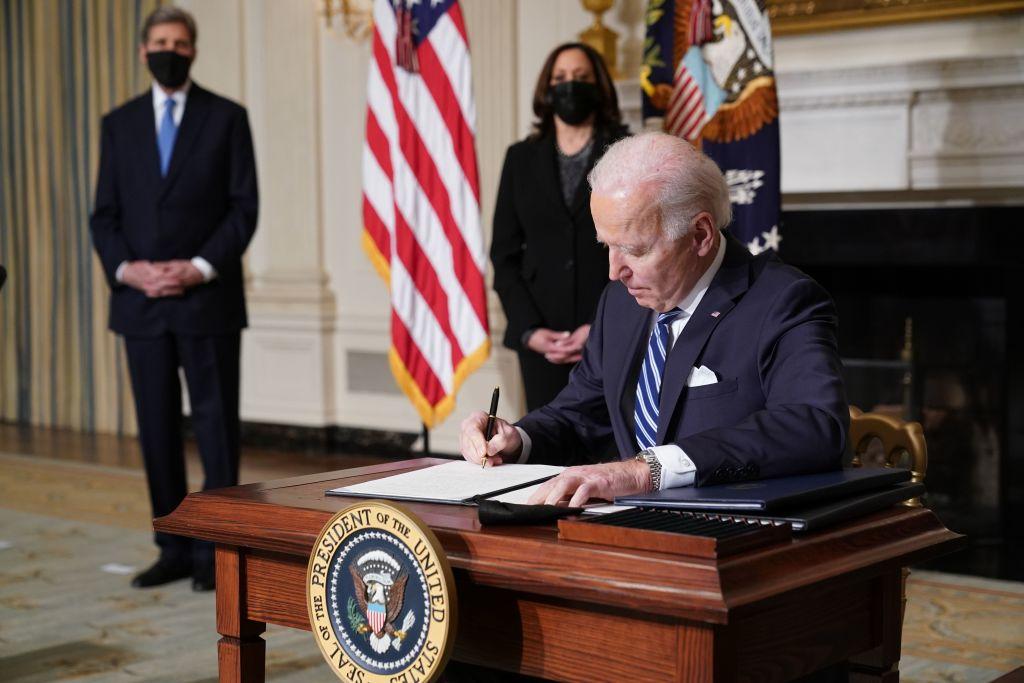
Up to 40 world leaders, including Australian Prime Minister Scott Morrison, will participate in a two-day virtual leaders’ summit convened by US President Joe Biden and timed to coincide with Earth Day. The summit is part of Biden’s major diplomatic offensive to galvanise nations to tackle climate change.
Biden has appointed former secretary of state John Kerry as his special climate envoy and one of his first acts as president was an executive order directing all US national security agencies to quickly get on board the climate agenda. For those agencies, it’s about making climate change part and parcel of their regular planning cycles, ranging from assessing climate impacts on military installations, war-gaming climate impacts and developing climate risk assessments.
Prominent in Biden’s executive order is the desire to partner with allies on climate diplomacy. This year is the 70th anniversary of the ANZUS alliance, formed on 1 September 1951. Biden’s Earth Day summit is a significant opportunity for Australia to align itself with the president’s reinvigorated US commitment on climate action.
There are several bold steps we might set out at the summit. Australia should adopt a leadership role on climate security in the Pacific islands region. Climate change is viewed there as the primary threat to security as recognised in the 2018 Boe Declaration.
Reducing global emissions means greater climate security for our island neighbourhood and supports the Morrison government’s commitment to its Pacific Step-up. Regional leadership on climate security would provide a soft-power counterpunch to China’s regional ambitions. China is the world’s largest greenhouse gas emitter, responsible for nearly 30% of global carbon emissions.
Talking about climate security could send a signal to our own defence organisation to get more serious about climate planning, commensurate with our Five Eyes partners who have well-developed policies on the strategic implications of climate change.
Regional leadership on climate security should include establishing climate change as a standing agenda item at key Pacific island security, diplomatic and aid dialogues. We should commit to convening a Pacific climate security summit with island leaders to define keys risks and develop a priority action plan.
Appointing a climate security envoy to work with regional governments on climate risks would be useful. We should reboot Indo-Pacific Endeavour, the annual Australian military activity to deepen partnerships and interoperability in the region, by strengthening the climate security context in its disaster response exercises. Commissioning a regional climate security threat assessment from a respected national agency or think tank and providing regular updates would be welcomed by regional leaders.
Pacific nations fear their islands could be swamped by sea-level rise, shrinking their offshore estates and rights to fishing and mining within their boundaries. They’re trying to lock in existing maritime zones now. Australia has been supportive of defining and declaring island baselines, limits and boundaries consistent with the law of the sea. But we should be more explicit that these limits should stay in place regardless of sea-level rise.
The last thing we want to see in our neighbourhood is China offering the massive dredgers it used to build its fortified islands in the South China Sea to Pacific countries so that they can build up their land to protect against sea-level rise.
Morrison’s department is stepping up its efforts to deal with climate change by creating a senior position to coordinate Australia’s strategy. The Department of Defence should be included in this strategy. The Morrison government could announce a commitment to reducing defence emissions, without compromising our military’s fighting capability. Defence emits around 1.6 million tonnes of CO2 equivalent per year, more than half of all federal government emissions. Of this, roughly half comes from the defence estate (such as offices); the rest is from its fighting forces (ships, aircraft, tanks and other capabilities).
As a first step, Defence could provide incentives for net-zero bases, mandate electric vehicles across its civilian fleet and undertake an audit of its estate for carbon offsetting and sequestration opportunities. It should actively support local defence industry, research, and development to deliver alternative non-hydrocarbon fuels. Initiatives such as the defence force’s new all electric off-road buggy, designed and built in Melbourne, are a great starting point.
Coupled with a stronger national emissions-reduction target, Morrison might present these ideas at Biden’s summit as a pathway to engagement with the US on climate change, demonstrating regional leadership and giving us added momentum heading towards the G20 summit in October and the 26th annual climate conference (COP26) in Glasgow in November.